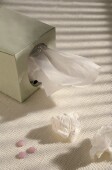- Double Mastectomy May Offer No Survival Benefit to Women With Breast Cancer
- Toxic Lead Found in Cinnamon Product, FDA Says
- Certain Abbott Blood Sugar Monitors May Give Incorrect Readings
- Athletes Can Expect High Ozone, Pollen Counts for Paris Olympics
- Fake Oxycontin Pills Widespread and Potentially Deadly: Report
- Shingles Vaccine Could Lower Dementia Risk
- Your Odds for Accidental Gun Death Rise Greatly in Certain States
- Kids From Poorer Families Less Likely to Survive Cancer
- Tough Workouts Won’t Trigger Cardiac Arrest in Folks With Long QT Syndrome
- At-Home Colon Cancer Test Can Save Lives
Allergy Season Springs Into Bloom


Many people are happy to see the end of this long, cold winter, but those with pollen allergies might not greet spring with open arms.
There are, however, a number of things people with pollen allergies — also called hay fever — can do to reduce or prevent symptoms, said Dr. Luz Fonacier, head of the allergy section at Winthrop-University Hospital in Mineola, N.Y.
It’s important to know what you’re allergic to so you can avoid those triggers, Fonacier said. An allergist can identify the things that cause allergy symptoms such as sneezing, runny nose and itchy eyes.
Some other things you can do: Monitor pollen and mold counts, and stay inside when they’re high. After working or playing outdoors, take a shower, wash your hair and change your clothes. Keep windows and doors shut at home and in your car during allergy season. Use air conditioning, which cleans the air.
Also, try to avoid mowing the lawn or raking leaves. If you have to do these chores, it might be a good idea to wear a mask, Fonacier suggested in a hospital news release.
Take allergy medications as prescribed and start using them before symptoms begin. Be careful when using over-the-counter allergy medications because they can cause sleep and thinking problems.
Allergy vaccinations are another option. They slowly introduce your body to allergens so it learns to tolerate them rather than triggering an allergic reaction. These vaccinations can reduce symptoms of many allergies, prevent the development of new allergies and, in children, stop allergies from progressing to asthma, Fonacier said.
Moving to another area of the country isn’t likely to help. Many types of pollen and molds are found across the nation, and you might encounter new allergy triggers if you move to a different region.
More information
The American Academy of Family Physicians has more about hay fever.
Source: HealthDay
Copyright © 2024 HealthDay. All rights reserved.










